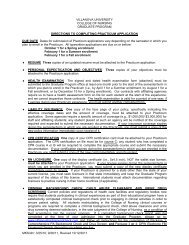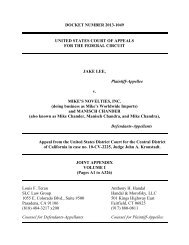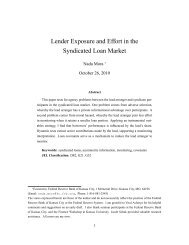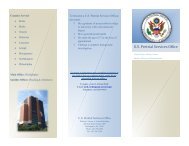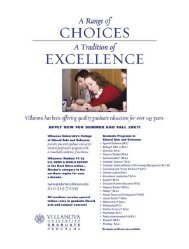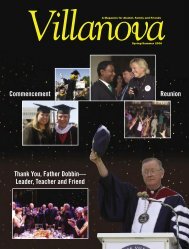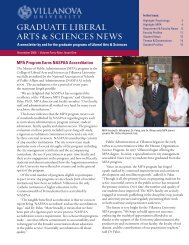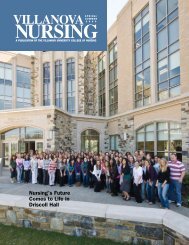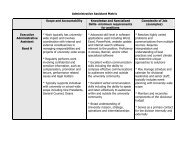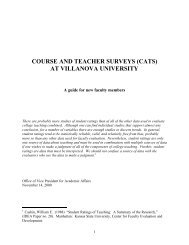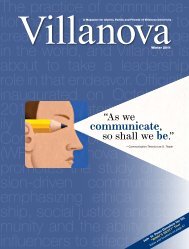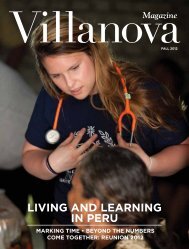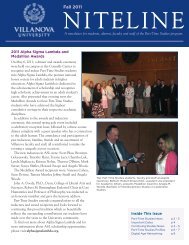Commencement 2007 - Villanova University
Commencement 2007 - Villanova University
Commencement 2007 - Villanova University
- No tags were found...
You also want an ePaper? Increase the reach of your titles
YUMPU automatically turns print PDFs into web optimized ePapers that Google loves.
©MICHELINE PELLETIER/CORBISEvents Explore Legacy of Renowned Egyptian NovelistBY MICHAEL NATARO ’06 A&S, ’08 G.S.Naguib Mahfouz(left), who wonthe 1988 Nobel Prizein Literature, was awidely celebrated yethighly controversialauthor in the Arabworld. Many believehe was the mostinfluential writer inmodernizing Arabic literature because hewrote about such contentious contemporarysubjects as existentialism, socialism, homosexuality,even God—literary topics consideredtaboo in mainstream Islamic society.In April, <strong>Villanova</strong> <strong>University</strong>’s Centerfor Arab and Islamic Studies co-sponsoredfour events celebrating the life of Mahfouz,who died in August 2006.The first one was the April 3 screening ofthe Egyptian film, “Adrift on the Nile,” basedon Mahfouz’s novel centering on a houseboatin 1960s Cairo. Following the film, NasserChour, an instructor in communication,discussed the film and the author’s legacy.On April 10, Dr. Roger Allen, a <strong>University</strong>of Pennsylvania professor of Arabic languageand literature, lectured on “NaguibMahfouz: Retrospect on a Literary Life.”Dr. Allen, who had done much of his academicwork in Cairo, knew Mahfouz personally.He considers the author to have beenone of the most profound humanists ever tolive, and described him as having a “killersense of humor” in his use of one-liners.Mahfouz, born in Cairo in 1911, was a devoutMuslim, despite what his detractors said,Allen noted. The Nobel laureate describedEgypt and Egyptian society with “disarmingaccuracy,” noted Allen, particularly in KarnakCafé, his novel exploring a pillar of Egyptianculture: the coffee house. A writer of sagaswith recurring heroes, Mahfouz publishedmany works that allegorically addressed issuesof religion, politics and society.In 1994, as Mahfouz was leaving his Cairoapartment, he was stabbed by an Islamistfanatic, which severely damaged his writingarm and almost cost him his life. Allen notedthat the Arabic language has no clear wordsfor “fiction” or “irony,” and to some in theArab world, these concepts can seem nebulousand unclear, and even blasphemous.Allen’s lecture in the St. AugustineCenter for the Liberal Arts was followedby a wine-and-cheese reception.The third event, co-sponsored by thedepartments of theatre and of classical andmodern languages and literatures, were twoone-act plays by Mahfouz that were performedin the Connelly Center Cinema.On April 17, the two performances of TheMountain featured <strong>Villanova</strong> students andwere directed by Dr. Dina Amin. She is anassistant professor of theatre and of Arabicliterature and culture. The evening performancewas followed by a reception. Thesecond play, Death and Resurrection, onApril 17, was directed by the Rev. DavidCregan, O.S.A., assistant professor oftheatre, who also acted in the production.The final event was a screening of“Midaq Alley,” a Mexican film starringSalma Hayek and based on Mahfouz’s vividnovel set in Cairo’s alleys during WorldWar II. The film was shown on April 24 inthe Connelly Center Cinema. Dr. José LuisGastañaga Ponce de León, assistant professorof classical and modern languages andliteratures, then discussed the film.“The events were extremely successfuland well-attended,” said Chour. “Theywere a wonderful opportunity to show the<strong>Villanova</strong> community the artistic contributionsof the Nobel Prize laureate in theareas of theatre, cinema and literature.”Mahfouz’ influence reached not onlythroughout Egypt and the Arab world, butglobally, he added.The Legal Challenges of Islamic Law in Western DemocraciesBY ANTHONY MAALOUF ’08 G.S.Muslim immigrants do not alwaysassimilate into Western-style societies,especially in Europe where they representa growing population. Dr. CatherineWarrick, assistant professor of political scienceat <strong>Villanova</strong> <strong>University</strong>, is researchingthe serious legal questions these democraciesnow face when religious law and civillaw conflict. She gave a talk about herresearch on March 16 in the Bryn MawrRoom of the Connelly Center. It was thefirst in a faculty research series sponsored bythe department of political science.The paper Dr. Warrick presented,“Islamic Law in the Legal Systems of WesternDemocracies,” examined the question ofwhether democratic legal systems can incorporatedifferent legal traditions, particularlyIslamic law (shari’a). She is studying cases—in Canada, the United Kingdom andIndia—where Muslim minority populationshave argued, in some cases successfully, for64 <strong>Villanova</strong> MagazineIncorporatingreligious law intodemocracies raisesserious questionsbut could also leadto “modernizing”of the religiouslaw, accordingto Dr. CatherineWarrick, an assistantprofessor of political science at <strong>Villanova</strong>.the state’s extension of legitimacy to legalpractices based on shari’a.For example, Canada had an option toallow a Muslim couple’s divorce case to behandled by a Muslim tribunal, rather thanby the Canadian legal system. “It was a voluntaryoption, designed to relieve the statefrom all the cases it had to deal with,” Warrickadded. However, the problem is whetherthe state should enforce religious law. “Whatdo you do when there is an appeal to theJOHN WELSHruling? Eventually the state needs to take arole, and this poses problems for a pluralistsystem like this one,” she said.The question of whether religious law,particularly Islamic law, can be incorporatedthrough pluralism has a mixedanswer. “It is ‘yes’ or ‘no,’ depending onhow skeptical one is,” Warrick said. “TheCanadian system, which also allowed forCatholics and Jews to conduct their ownlegal practices, held for 14 years before itwas outlawed.”Incorporating different legal traditionsinto democracies raises serious questions,especially about gender equality, Warrickconcluded. However, there also could bereformatory outcomes, where the integrationof religious law into democratic systemscould, in fact, “modernize” the religious law.Warrick earned her Ph.D. at Georgetown<strong>University</strong> in 2002 and researches comparativelaw, Middle East politics and genderissues. To encourage discussion following hertalk, those attending had been asked to readher paper in advance. She also presented thepaper during the fall 2006 conference of theAmerican Political Science Association.



